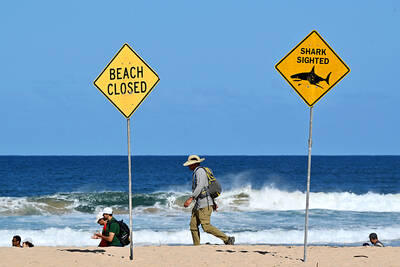More aid workers in Darfur, the troubled Sudanese region, have been killed in the past month than in the previous three years of conflict there, the UN said on Tuesday.
Eight aid workers, all of them Sudanese, were killed in July in attacks across Darfur, the UN said, compared with only six from 2003, when the conflict began, through June.
"The level of violence being faced by humanitarian workers in Darfur is unprecedented," Manuel Aranda da Silva, the top UN aid official in Sudan, said in a statement.
The violence has already contracted the scope of aid operations, depriving tens of thousands of people of food handouts, medical care and clean water. Beyond that, the deepening chaos imperils the effort to help millions of other displaced people in the region, officials of aid groups that work in the region say.
A UN map of no-go areas is covered with blotches of orange, indicating vast regions where aid workers cannot reach people trapped in camps and villages. About 14,000 workers are in Darfur, 1,000 of them foreigners.
The spike in violence has occurred as the peace agreement signed in May has faltered. The pact was supposed to end the fighting in a conflict between non-Arab rebel groups and the Arab-dominated central government, from which the rebel groups sought greater autonomy and more of Sudan's wealth for the long-neglected Darfur region.
But the landscape has grown more perilous since the pact was signed in Nigeria. On Monday, the rebel leader who signed it, Minni Arcu Minnawi, became the senior assistant to the president, as stipulated by the agreement, but amid allegations that his troops were carrying out bloody raids in North Darfur to try to punish other rebel groups that had not signed the agreement.
Minnawi met with US President George W. Bush at the White House on July 25, in the wake of a UN report released earlier in the month that said Minnawi's troops were "indiscriminately killing, raping women and abducting."
Elements of the two groups that did not sign, the Justice and Equality Movement and a faction of the Sudan Liberation Army, have joined forces to form the National Redemption Front, which is firmly opposed to the agreement. The group said on Monday that it had shot down a government Antonov bomber, a statement the Sudanese military quickly denied. The latest fighting in North Darfur has routed 25,000 people from their homes.
The crowded camps in Darfur and eastern Chad, where 2.5 million people pushed from their homes in recent years by the conflict live, have become anxious and turbulent, making aid work in them especially dangerous.
"Since the signing of the agreement, Darfur has become increasingly tense and violent," Paul Smith-Lomas, regional director of Oxfam, an aid group with a large presence in Darfur, said in a press statement.
The declining security situation, he added, "has led to the deaths of too many civilians and aid workers."

With much pomp and circumstance, Cairo is today to inaugurate the long-awaited Grand Egyptian Museum (GEM), widely presented as the crowning jewel on authorities’ efforts to overhaul the country’s vital tourism industry. With a panoramic view of the Giza pyramids plateau, the museum houses thousands of artifacts spanning more than 5,000 years of Egyptian antiquity at a whopping cost of more than US$1 billion. More than two decades in the making, the ultra-modern museum anticipates 5 million visitors annually, with never-before-seen relics on display. In the run-up to the grand opening, Egyptian media and official statements have hailed the “historic moment,” describing the

SECRETIVE SECT: Tetsuya Yamagami was said to have held a grudge against the Unification Church for bankrupting his family after his mother donated about ¥100m The gunman accused of killing former Japanese prime minister Shinzo Abe yesterday pleaded guilty, three years after the assassination in broad daylight shocked the world. The slaying forced a reckoning in a nation with little experience of gun violence, and ignited scrutiny of alleged ties between prominent conservative lawmakers and a secretive sect, the Unification Church. “Everything is true,” Tetsuya Yamagami said at a court in the western city of Nara, admitting to murdering the nation’s longest-serving leader in July 2022. The 45-year-old was led into the room by four security officials. When the judge asked him to state his name, Yamagami, who

DEADLY PREDATORS: In New South Wales, smart drumlines — anchored buoys with baited hooks — send an alert when a shark bites, allowing the sharks to be tagged High above Sydney’s beaches, drones seek one of the world’s deadliest predators, scanning for the flick of a tail, the swish of a fin or a shadow slipping through the swell. Australia’s oceans are teeming with sharks, with great whites topping the list of species that might fatally chomp a human. Undeterred, Australians flock to the sea in huge numbers — with a survey last year showing that nearly two-thirds of the population made a total of 650 million coastal visits in a single year. Many beach lovers accept the risks. When a shark killed surfer Mercury Psillakis off a northern Sydney beach last

‘CHILD PORNOGRAPHY’: The doll on Shein’s Web site measure about 80cm in height, and it was holding a teddy bear in a photo published by a daily newspaper France’s anti-fraud unit on Saturday said it had reported Asian e-commerce giant Shein (希音) for selling what it described as “sex dolls with a childlike appearance.” The French Directorate General for Competition, Consumer Affairs and Fraud Control (DGCCRF) said in a statement that the “description and categorization” of the items on Shein’s Web site “make it difficult to doubt the child pornography nature of the content.” Shortly after the statement, Shein announced that the dolls in question had been withdrawn from its platform and that it had launched an internal inquiry. On its Web site, Le Parisien daily published a